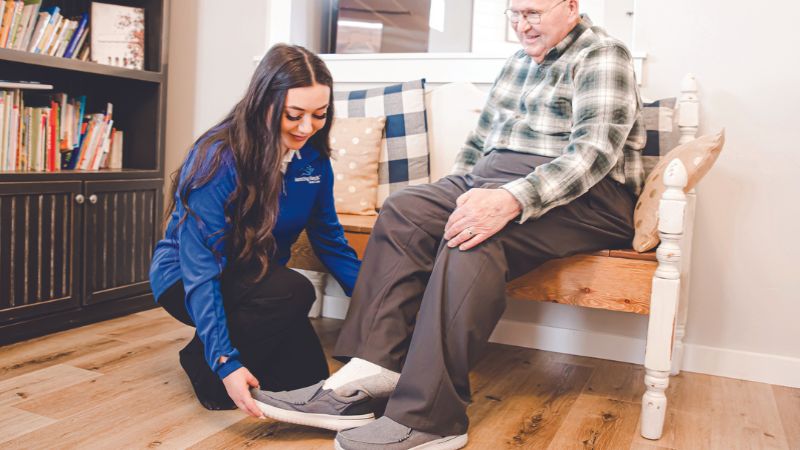

Falls in older adults can result in far more than just sprains or fractures—they can significantly increase the risk of stroke. According to the Illinois Department of Public Health, falls are the leading cause of traumatic brain injuries (TBIs) among seniors, accounting for 37% of TBI-related deaths and 56% of hospitalizations. A TBI can damage blood vessels in the brain and disrupt normal clotting functions, potentially leading to either an ischemic or hemorrhagic stroke. For caregivers, reducing fall risks is a vital part of safeguarding a loved one’s long-term health. And if a fall involves a head injury, seeking immediate medical care could be lifesaving.
How Common are Falls in the Elderly?
Falls are unfortunately very common among seniors. The Centers for Disease Control and Prevention (CDC) reports that 1 in 4 adults over age 65 experiences a fall each year. Of these, about 1 in 10 results in a serious injury that requires medical treatment or causes long-term limitations in mobility and activity.
Each year, nearly 3 million older adults visit emergency rooms because of fall-related injuries. These can range from fractures and sprains to head injuries—and as the data shows, many of these head injuries lead to more severe complications like strokes.
What Increases Fall Risk in the Elderly?
A number of age-related conditions increase the risk of falls in the elderly. Poor eyesight and hearing can be precursors to falls. Seniors also have slower reflexes that prevent them from responding swiftly to a fall hazard, such as clutter or furniture in their walking path.
Certain conditions, like diabetes, heart disease, and issues with the nerves, feet, or thyroid, lead to a decline in balance and subsequent falls. Mild cognitive impairment and dementia are additional age-related health conditions that are responsible for falls in this population.
Postural hypotension, which is a significant drop in blood pressure upon quickly rising up from sitting or lying down, is also a risk factor for falls. Seniors take multiple medications and their side effects can lead to dizziness and confusion that precede a fall.
How Head Injuries Raise Stroke Risk
Can a fall actually increase a senior’s risk of stroke? The answer is yes—especially if the fall results in a traumatic brain injury. Approximately 10% of falls in older adults lead to TBIs, which weaken brain blood vessels and can interfere with normal clotting.
There are two primary types of strokes related to fall-related head injuries:
-
Ischemic stroke: Caused by a blood clot blocking an artery in the brain. This is the most common type and can occur when brain trauma triggers abnormal clotting.
-
Hemorrhagic stroke: Occurs when a weakened blood vessel ruptures and bleeds into brain tissue. These account for about 13% of all strokes and can result from vessel damage caused by a fall.
Both types of strokes can result in lasting disability or death—making fall prevention a key component of stroke prevention in seniors.
What Should Seniors Do After a Head Injury?
While many falls do not result in serious injury, over one-third of the injuries sustained after a fall cause restricted activities or reduced independence in completing everyday activities. A head injury, however, should prompt the older adult to seek immediate medical attention.
Head injuries, especially in older adults who take certain prescription medications, like blood thinners, can be serious. It’s critical that a caregiver take the older adult to the nearest medical facility to ensure the latter has not sustained a brain injury.
Best Practices for Preventing Falls in Seniors
Seniors can lower their chances of a fall and thereby a head injury and stroke by taking care of their health. Exercise regularly to strengthen muscles and keep the joints, tendons, and ligaments flexible. Walking and climbing stairs are mild-weightbearing activities seniors can perform.
Improve muscle strength and balance with yoga, Pilates, or tai chi. Seniors might take an outdoor class in yoga or tai chi or simply perform them in the comfort of home. The elderly should try weightlifting to build muscle. Resistance bands are likewise useful for increasing strength.
Schedule vision and hearing exams. Even minor changes to sight and hearing are linked with an increased risk of falls. Wear any prescription glasses and ensure they fit properly. If a hearing aid is prescribed, be sure it fits well and wear it.
Be alert for any side effects of medications. Seniors who feel dizzy or sleepy after taking prescription medicines should notify their doctor. Medication adjustments can be made and may help prevent a fall. Older adults should also get enough sleep; tired seniors are more likely to fall.
Additional fall prevention strategies include using an assistive device, such as a cane or walker, for mobility support as well as removing clutter from the home. The support of a professional caregiver from Assisting Hands Home Care is essential for improving overall health and home safety.
Assisting Hands Home Care Helps Reduce Fall Risk at Home
At Assisting Hands Home Care, we know that even a single fall can change everything for a senior—and that a few preventive steps can make all the difference. That’s why fall prevention is built into the heart of every care plan we create.

Our experienced caregivers help older adults stay steady and confident by:
- Assisting with safe movement throughout the home
- Providing transfer support—like getting in and out of bed or chairs
- Keeping walkways clear and removing clutter or trip hazards
- Driving to and from medical appointments, including vision and hearing checkups
- Watching for medication side effects that can cause dizziness or confusion
With thoughtful, hands-on support, we help seniors stay independent longer, and we give families the reassurance that their loved ones are in caring, capable hands.
To learn more about how we can help your senior loved one thrive at home, and to explore our personalized elderly home care services in Batavia, IL and the surrounding areas, schedule a free consultation with Assisting Hands Home Care today.
